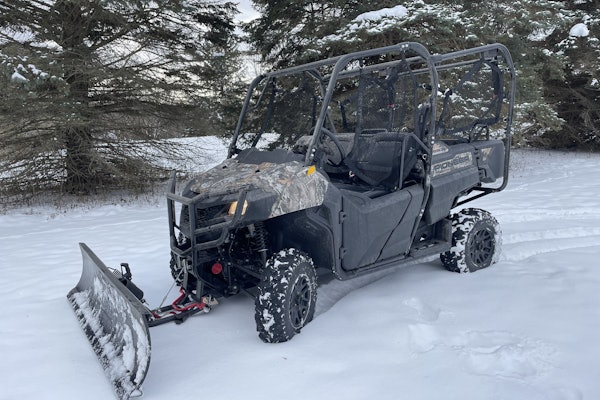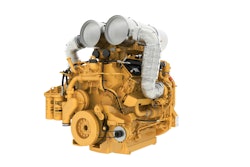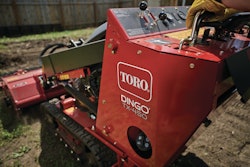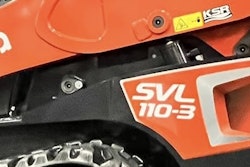The Louisville, Kentucky, division of aerial and underground utility contractor Team Fishel is comfortable when rental machines make up less than 20 percent of its total fleet. “That gives us a quick-release cushion if the market changes,” says Rich Mauldin, area manager.
Team Fishel, with corporate headquarters in Columbus, Ohio, and offices in 11 states, experienced the cushioning effects of rental first hand. In the gung-ho late 1990s there were times when the Louisville division’s fleet was 40 percent rented.
Then came what Team Fishel chairman Jeff Keeler labels “the train wreck of 2000.” When the telecommunications market took a sharp nose dive, Fishel literally looked up to find replacement work. For the past three years, the traditional underground contractor also has been putting in overhead electric facilities in three states, including Kentucky.
A rental apprenticeship
With this work came new equipment needs, including bucket trucks and digger derricks, and Team Fishel used rental to dip its toe into the uncharted waters. “These trucks represent a big investment,” Mauldin says. “In fact, we still continue to be cautious about buying them.”
The trucks also support a new Team Fishel initiative, a four-year lineman apprenticeship program. “When we got into this type of work, we had the opportunity to hire some retired Louisville Gas & Electric linemen,” Mauldin explains. The company quickly realized it only had a five-to-seven-year window before these experienced journeymen would want to retire again.
One way for Team Fishel to retain their knowledge was to create the apprenticeship program, now pending U.S. Bureau of Apprenticeship and Training certification. The company is currently training 14 apprentices using 35-foot to 55-foot double bucket and digger derrick trucks. And every time the company adds two or three apprentices or veterans, it adds another rental truck.
Team Fishel’s overhead line work has led to the rental of both bucket trucks and digger derricks.
In the trenches
Even though its telecommunications work was hard hit, Fishel’s underground work is still going strong. The Louisville office has an underground distribution contract with Louisville Gas & Electric, a contract that also includes terminating electric and hot cable, storm recovery and overhead line work.
“Probably 60 percent of the work we do for LG&E is joint trench work,” Mauldin says. In a joint trench, crews dig a 4-foot trench and lay electric, telephone and cable TV conduit and/or direct-buried cable, then top it off with about 12 inches of sand. A gas distribution line is then laid on top of the sand and the trench is backfilled.
“We’ve been doing joint trenches out of this office for close to eight years,” Mauldin says. “They’re usually installed in new subdivisions or commercial sites. It’s cost effective for the utilities and developers since the utilities can be installed faster. They also decrease the chances of a utility hit because everything’s in one place.”
In addition, the division has started to bid sewer and water jobs. “Since we’re still developing this type of work and there’s a lot of fluctuation in the work load, we’ll use rental machines there as well,” Mauldin says.
Spreadsheet rental
Micheal Wathen, Team Fishel’s Louisville fleet manager, keeps a spreadsheet on what the division rents. “It helps us manage our rentals,” Mauldin says, “and to know what we’ve got where, what our rental dates are, etc. Sometimes it will show you the best time to release a rental.”
Wathen handles the rentals for all jobs in the division, following the directives of each project manager. With around 39 jobs going on at once, keeping track of who’s got what can be a challenge.
“The spreadsheet helps us control having excess equipment sitting around,” Mauldin says. “We ask a lot of questions in this meeting. It’s part of our culture to attack waste, and these guys hate nothing more than for me to ask them to get rid of equipment. They keep a close eye on it, so we have a good first line of defense.”
Team Fishel Louisville division members Chris Hensley (left) and Rich Maudlin.
The spreadsheet lists the purchase order number, job number, vendor name, equipment description, serial number, the start date, rate information, rental term, etc. Mauldin pays special attention to the start date and comments fields on this report. “It tells me at a glance how long we’ve had it and what we’re using it for,” he says. “If we’ve rented something for a long time, maybe we need to buy it or call corporate and get a machine.”
If the division keeps a machine for more than a month, it treats it as a long-term, in-house rental and gives it an asset number. “This allows us to track fuel usage,” Mauldin explains. “It also gives us a history so we can properly create our in-house rental rates.”
On a typical week, the division will have on rent three to nine backhoes, large excavators equipped with breakers, large trenchers, shoring and a number of small items, such as air compressors and gen sets. “Even in our contracted work we try to keep a percentage of rental equipment on the job because the work will accordion in and out depending on the economy or budgets,” Mauldin says.
A break-even operation
Nationwide, Team Fishel manages its fleet to be a break-even operation. “We’re keen on the professional appearance of our owned fleet,” Mauldin says. The company owns the bulk of its utility trucks, fleet service trucks, backhoes, tool trailers and directional drills.
Team Fishel’s corporate fleet and purchasing managers handle equipment purchases. “They determine which equipment is better to buy and which is better to put on a rental purchase option or a long-term lease,” Mauldin says.
While corporate oversight is always involved, each Team Fishel division has a great deal of leeway in handling its own rental needs. “But if we got up to a 25-percent rented fleet,” Mauldin says, “they’d probably ask questions.”
Just a phone call
Mauldin appreciates the rental vendors he works with, including Americon, a Cat Rental store.
He cites the time when the division was working in downtown Louisville late at night and a rental machine went down. “It just took one phone call,” he says. “They got out of bed and came down and fixed it. They feel like that service is part of their business. If we need a machine, I feel like they would almost try to build it in order to fulfill our request.”
And if Fishel crews working out of town need an early Monday start, sometimes the machine is delivered a day or two before. “I don’t want to pay for a machine to sit there all weekend,” Mauldin comments, “but I also don’t want to have my crew idle at 10 a.m. waiting for it to get there. Most of the time, the machines are waiting on us. They’ll deliver it during the weekend and won’t charge us anything. They want to be a long-term partner as much as we do.”










